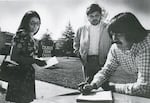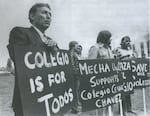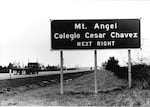Oregon’s colleges and universities have been adapting for years to serve one of the state’s fastest-growing demographics: Latino students. Institutions have announced new programs focused on Chicano and Latino studies, and some Oregon schools are moving closer to becoming Hispanic Serving Institutions — a federal designation for institutions with at least 25% Latino student enrollment.
But efforts to better serve Latino students in the state started a long time ago. Fifty years ago, a handful of educators and advocates established the nation’s first four-year independent Chicano university. Though the institution closed its doors just 10 years after they opened, Colegio César Chávez’s founders say the school’s legacy continues today.
PODER, Oregon’s Latino Leadership Network, is hosting a 50th anniversary celebration in honor of Colegio César Chávez Saturday.
“If you look at what the colleges were offering then and what they are offering now, there’s been a big, big change,” said Jose Romero, one of the founders of Colegio César Chávez. “We made an impact in that.”
Romero, along with Celedonio “Sonny” Montes and and a few others, founded Colegio César Chávez in 1973 in Mt. Angel, Oregon. The college took over a campus that had previously been Mt. Angel College, owned by The Benedictine Sisters of Mt. Angel.

(From left) Jan Chavez, Sonny Montes and Jose Romero in front of Colegio César Chávez in 1973.
Courtesy of Karen Olivo, Movimiento
In the 1970s, college enrollment was dropping, Romero told OPB, so college staff began actively recruiting Latino students for the first time. By 1973, 35% of the student population was Latino, he said.
Romero says Latino students were deeply involved in how the college operated.
“They had a lot to say in what they wanted to learn in terms of bilingual education, bicultural education, Chicano studies and so on,” Romero said.
On Dec. 12, 1973, following a discussion with students, staff and community members, college leaders decided to change the name of Mt. Angel College to Colegio César Chávez.
“[We were] honoring an icon, who was still alive at the time, who came and visited us many times — honoring the work that he had done, especially for civil rights and the farm worker community,” Romero said.
During its operation, along with offering classes on campus, the school created a “college without walls” program — an experimental and flexible learning program in which students could get college credit for their work and experience outside of the classroom.
Romero said for instance, students who were working in schools as aides or working for social service agencies could take those experiences and translate them into a portfolio, rather than strictly taking classes with a traditional grading system.
“Why not take all that experience and convert it into a portfolio supplemented with education,” Romero said, “and provide them an opportunity to work and to learn and to experience … It helped us a lot in meeting the needs of our students. Some didn’t have to be there all the time, but they could come in on weekends, or some could come quarterly for reviews of their portfolio.”
Colegio closed just 10 years after its founding when it failed to shed the roughly $1 million in debt it inherited from Mt. Angel College, but both Romero and Montes said the school was revolutionary in its short time.
During Colegio’s existence, Romero said the school graduated more than 50 students — many of them children of farmworkers or farmworkers themselves.
In 1977, Colegio graduated 22 Chicano students — more than the number of Chicano students who graduated from University of Oregon and Oregon State University combined that year.
“There was a lot of inspiration and hope that for once those students who were not recruited, not enrolled, not invited to attend colleges and universities throughout Oregon were now able to come and be part of a learning experience,” Sonny Montes told OPB.
After Colegio closed, the building was returned back to The Benedictine Sisters. It continued on as a monastery until the sisters decided last year to move out. According to the Benedictine Sisters, plans aren’t yet finalized for what the space could become in the future.
Romero and Montes said they are proud of the lasting impact Colegio made on Oregon higher education while it was operating.
“A lot of kids go to college and they come back saying, ‘You know what, I wish I would have learned more about our culture, our history, more bilingual [education].’ … We made an impact in that. We brought that to the attention of the colleges and universities,” Romero said. “We wish we could have served more students, and we would have had we lasted longer, but what we did in the 10 years of our existence — we planted seeds.”

Community members participate in a demonstration in support of Colegio César Chávez in this undated photo supplied by Karen Olivo of Movimiento.
Courtesy of Karen Olivo, Movimiento
Romero and Montes’ work did not stop when Colegio closed its doors. They, and other Colegio leaders, continued to push forward on opportunities and progress for Latino Oregonians.
Both Romero and Montes advocated for the city of Portland to change 39th Avenue to César E. Chávez Boulevard.
“We needed an icon. We needed a role model, and we’re still at it,” Romero said. “We’ve been doing it now for 50-some years, and we’re still at it.”
Their involvement in education also continued. Romero and Montes created the César E. Chávez Student Leadership Conference in 1990 — beginning as a gathering of Latino students from Portland Public Schools. Romero and Montes said now the conference brings in thousands of students from across Oregon to learn from keynote speakers, attend sessions and go on college campus tours. Western Oregon University has hosted the conference for the past several years.
According to Portland Public Schools, since the conference’s inception, it’s awarded more than $600,000 in scholarship dollars to students.
“There was still a lack of leadership training for our young people. There was a lack of mentoring for our young people, and those are the things that carried us through the struggle,” Montes said. “And it was obvious that it was still needed today, in 2023.”
In many ways, the higher education landscape in Oregon looks similar to how it did when Colegio César Chávez was created. Enrollment has been steadily declining at most of the state’s public colleges and universities, and many schools are making a larger effort to recruit and retain Latino students.
Those efforts include initiatives at Western Oregon, Portland State and other colleges in the state to gain recognition as Hispanic Serving Institutions.
Romero and Montes said it’s great to see the public universities making an effort to enroll Latino students, but there’s still more work to be done.
“It’s one thing to have students. It’s another thing to have support programs in place,” Montes said. “It’s also another level where you have to bring in diversified staff that represents your student body.”

Road sign noting Colegio César Chávez in Mt. Angel, Ore., in 1973.
Courtesy of Andrew Parodi